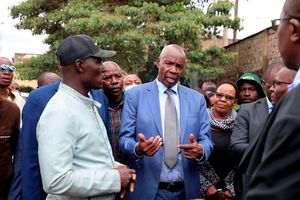Energy CS Davis Chirchir rated worst performing minister: Tifa survey

Cabinet Secretary Davis Chirchir.
Energy Cabinet Secretary (CS) Davis Chirchir rated at 19 percent is the worst performing member of President William Ruto's Cabinet, followed by Gender CS Aisha Jumwa (23 percent), according to the latest Tifa opinion poll.
Treasury CS Njuguna Ndung'u, Water CS Zacharia Njeru and Lands CS Alice Wahome are among the five worst performing CSs, rated at 24 percent.
The parameters used to calculate the overall scores included: whether they are known to Kenyans and whether Kenyans trust them to deliver on their mandate.
Interior CS Kithure Kindiki was ranked as the best performing with an overall score of 65 percent.
Prime Cabinet Secretary Musalia Mudavadi, who also serves as the Foreign Affairs CS, emerged second with a 62 percent score while Education CS Ezekiel Machogu was ranked third with a 58 percent score.
Researchers also asked Kenyans whether they were confident in the commitment, transparency and openness with which the CSs handle issues facing their ministries.
In the survey, Prof Kindiki and his Roads counterpart Kipchumba Murkomen led the pack in terms of visiting the highest number of counties.
On the other hand, Mr Mudavadi, Mining CS Salim Mvurya and Sports CS Ababu Namwamba have made the most foreign trips.
The survey conducted between November 25 and December 7, 2023, had a sample size of 3,009 respondents.
According to Tifa, the reported number of foreign trips was gathered from the CSs' social media handles, excluding activities and visitors to their offices.
Prof Kithure led with 41 reported trips to various regions.
He is closely followed by Mr Mudavadi with 23 trips, Health CS Susan Nakhumicha and Mr Machogu (20 trips each) and Mr Murkomen (19).
Tifa says the figures reflect the extensive regional engagements undertaken by these prominent CSs, demonstrating their active involvement and visibility in different parts of the country.
In order to track the conditions Kenyans have experienced over time and their opinions on certain issues, Tifa said some questions included in previous surveys were repeated, while others relating to the specifics of the current situation were asked for the first time.
The research found that many Kenyans believe that the runaway cost of living is a nightmare for the Kenya Kwanza government.
Four in 10 Kenyans cited the rising cost of loving as the most important challenge facing the Kenya Kwanza administration.
When it comes to the challenges facing Kenya Kwanza's regime, those aligned with the opposition are more likely to cite corruption - a governance failure that can be attributed to the leadership - at 19 percent, the survey found. Only 12 percent of government supporters cited the vice.
In the same breath, three times as many government supporters as opposition supporters cite the burden of debt repayment, especially as Kenya Kwanza leaders continue to blame this challenge on the previous government.
Similarly, three times as many government supporters blame the government's failures on opposition pressure to cut services to citizens.
The report also found that nine out of 10 Kenyans have reduced personal spending due to the cost of living.
Due to the skyrocketing cost of living, Kenyans have reduced spending on transportation by 15 percent, clothing by nine percent and entertainment by eight percent.
The report also found that the monthly income categories of Kenyans showed only slight differences, with the more affluent (earning over Sh20,000 per month) experiencing a slightly lower impact.
"If the sample had included a statistically significant proportion earning much more, say over Sh100,000, this contrast would likely have been even more pronounced," Tifa said.
The researchers also found that while a slim majority of Kenyans (59 percent) buy most of their food from shops and kiosks, urban dwellers are far more likely to do so than those living in rural areas.
Among rural dwellers, however, only about half (49 percent) rely on their own shambas as their main source of such consumables, presumably providing them with at least some protection from the recent steady rise in the cost of living.
Among income earners at all levels, the survey found, the vast majority cite food as the main item on which they have recently had to reduce spending due to inflation.
"This is true for those in all three income categories, although the slightly better off (those earning over Sh20,000) have had to do this slightly less than those earning the least (under Sh5,000) ... while the second most common reduction among the former has been on transport," the survey revealed.
The researchers also found that less than half of those who earn some money (42 percent) say they are able to regularly save something at the end of each month.
However, the researchers found that there is a clear correlation between this ability to save and income, with the lowest income earners (less than Sh5,000) significantly less able to do so than those in the highest income category (over Sh50,000).
The vast majority of Kenyans (84 percent) believe that their current economic situation is worse than it was a year ago. This is true regardless of political affiliation, although almost four times as many Kenyans who support the Kenya Kwanza government say they are better off at 11 percent than those who support the opposition at three percent.
In terms of geographic distribution, Tifa said, the highest proportion of those who feel they are worse off now reside in the Lower East, Nairobi and Nyanza, accounting for 88 percent.
"While the results presented are accurate (within the stated margins of error), it is important to note that a significant number of major events have occurred during the data collection period and since (prior to this release) that could have affected respondents' views had they occurred earlier and had respondents been aware of them," Tifa said of the research.






